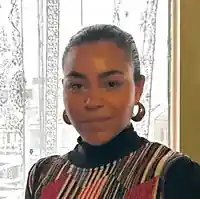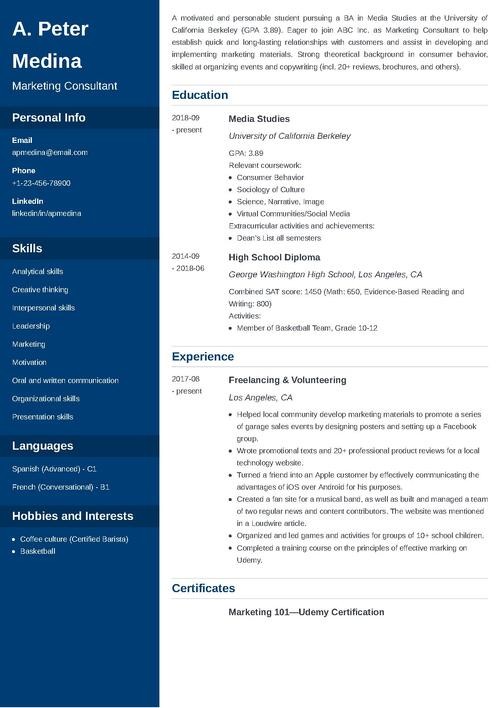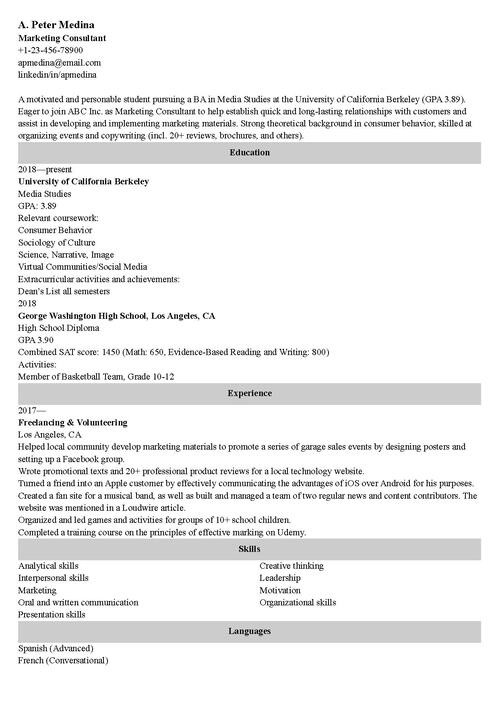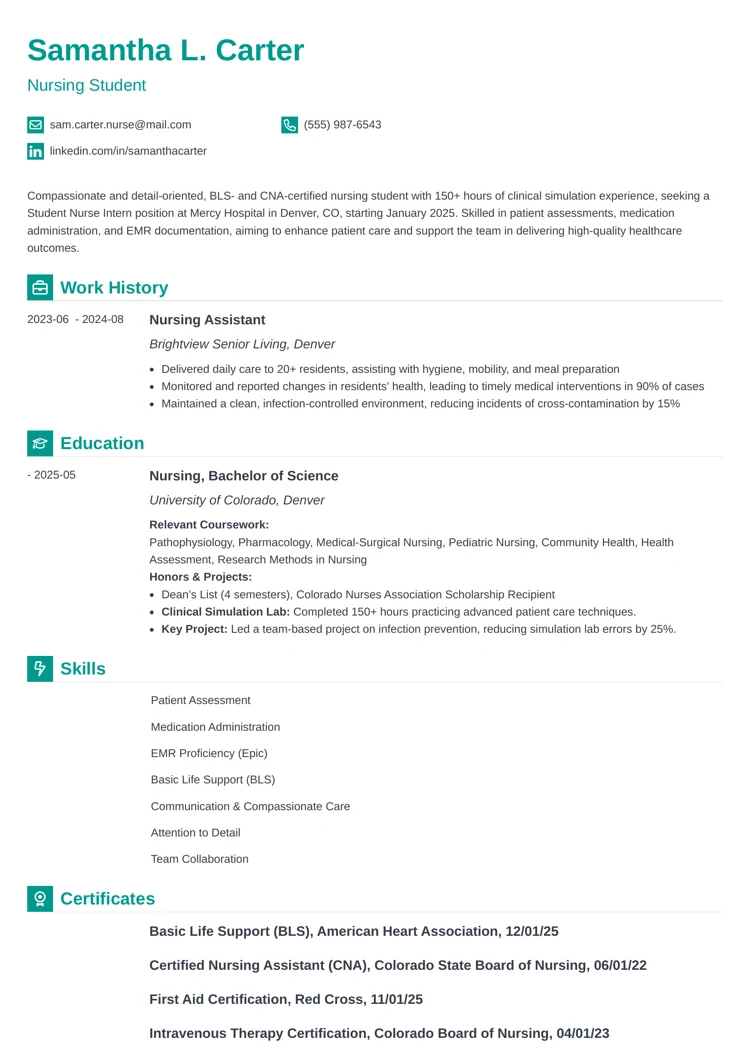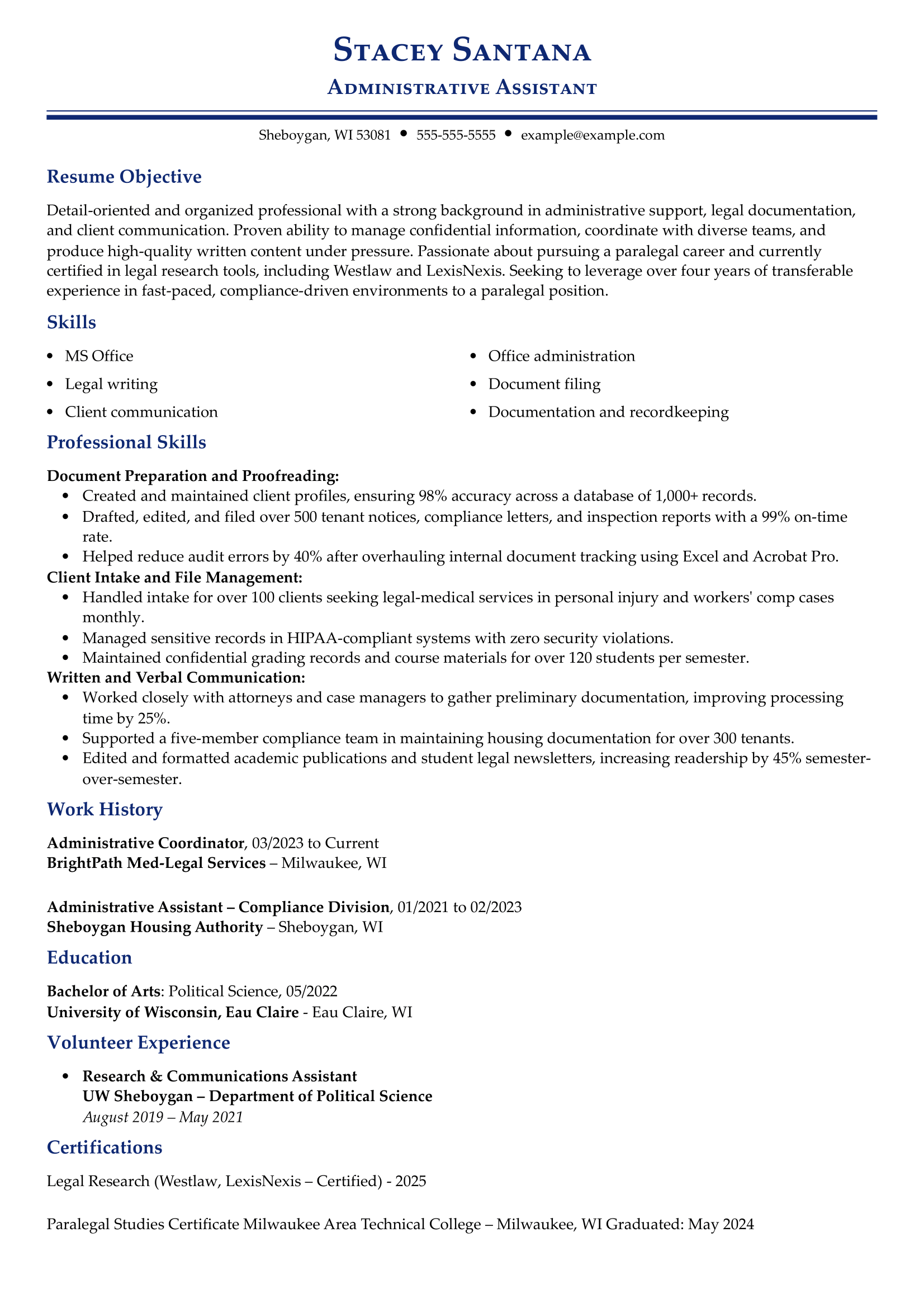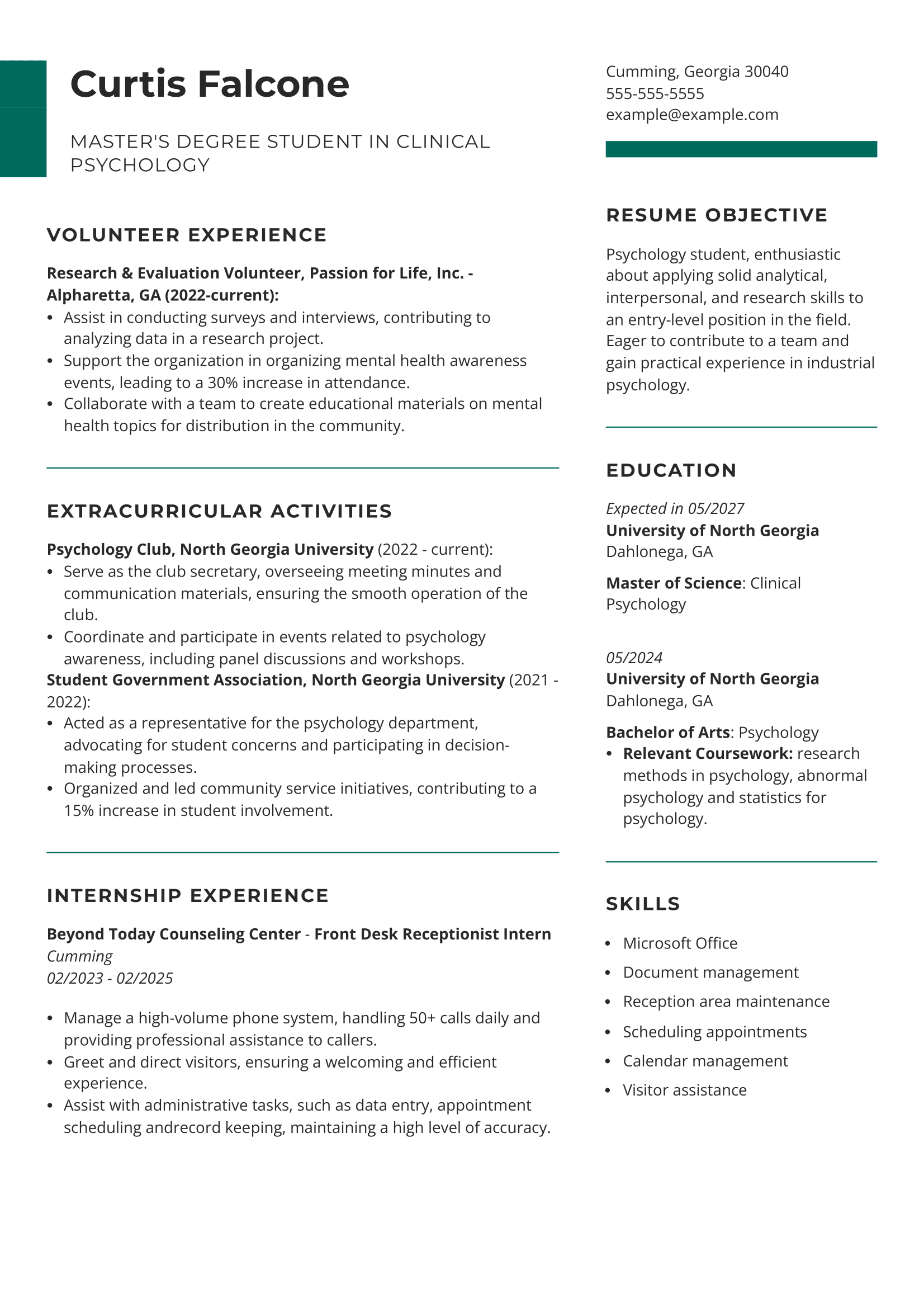Writing a resume with no work experience can feel like standing at the starting line with no running shoes. You’re ready to go, but unsure how to begin. The good news? You already have more to offer than you think.
Skills from school, volunteer work, hobbies, and personal projects can all show employers what you’re capable of. With the right strategy, you can transform your background into a resume that stands out.
In this guide, you’ll learn how to highlight your strengths, make the most of your qualifications, and craft a resume that opens doors to new opportunities.
Want to save time and have your resume ready in 5 minutes? Try our Resume Builder. It’s fast and easy to use. Plus, you’ll get ready-made content to add with one click. Explore our free resume templates and start building your resume today.
Sample resume made with our builder—See more resume samples here.
Before you dive deeper, look at the video created by our career expert Caio on how to create a resume with no experience:
How to Make a Resume for a First Job: Step-By-Step Guide
Creating your first resume with no experience is all about making the most out of your skills, education, and nontraditional experiences. Let's go over it, step by step:
Step 1: Gather your information
Before starting your first job resume, it's essential to read the description for your target role. Make note of the requirements: What skills and expertise is the employer looking for?
Then, think carefully about what you've done in the past. Consider experiences like:
- Volunteer work
- College clubs and organizations
- Hobbies
- Personal projects
- Academic degrees
- Online courses or special training
All of these help build your skill set and provide real-world scenarios where you can apply your knowledge and talents. Once you have a clear idea of what you can offer the role, you can begin creating your resume.
Step 2: Pick the correct resume format
Your resume format organizes your sections to make sure you lead with your strengths. Choosing the right format can be just what you need to improve your chances of getting an interview.
For first-time job seekers, we recommend opting for a functional resume format. A functional resume emphasizes your professional skills. You can even organize them by category, highlighting a balanced skill set.
Step 3: Add your contact details
Your resume header features all the information recruiters and hiring managers need to contact you and schedule an interview. Include the following:
- Full name
- Phone number
- Professional email
- City and state
- Optional: Professional website or portfolio
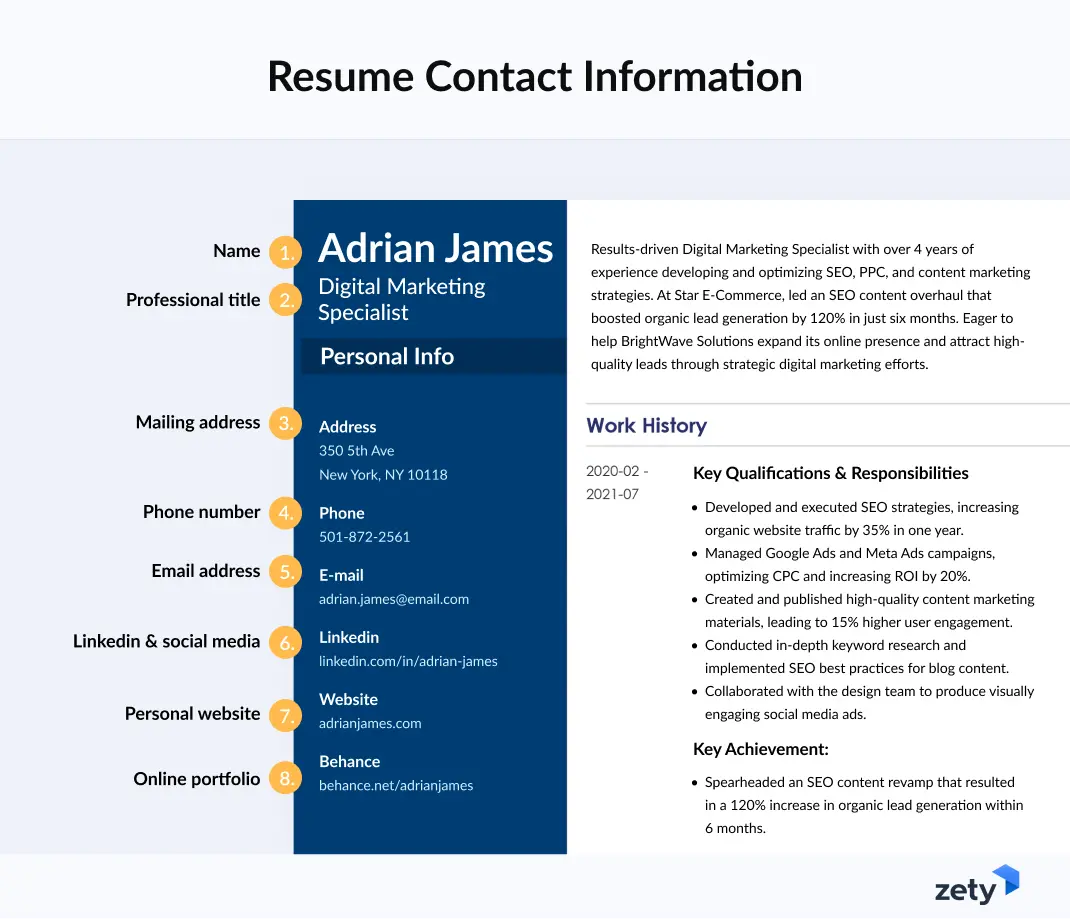
Step 4: Write a strong resume objective
A resume objective is a short introduction that highlights your most relevant skills and career goals. Aim to grab the hiring manager's attention with three to four sentences that explain what you hope to contribute to the company.
If you have completed relevant coursework or an internship, mentioning these is a great way to show you are the right fit for the role!
Use this formula:
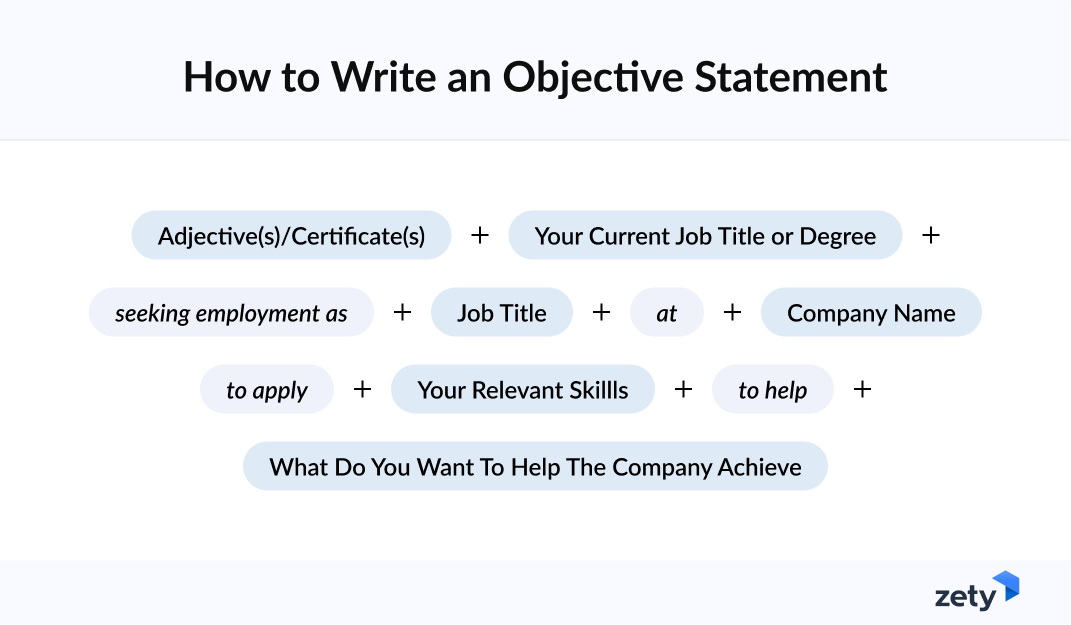
Here's an example of how a resume objective might look:
| Example |
|---|
|
Recent advertising graduate with a strong foundation in brand strategy, digital marketing, and content development. Skilled in creating engaging copy, managing social media campaigns, and producing visual content across multiple platforms. Completed coursework in consumer behavior, digital media strategy, and creative writing, developing both analytical and creative skills. Eager to bring fresh ideas, storytelling expertise, and a results-driven approach to support innovative campaigns and strengthen client brands. |
Step 5: Highlight your skills
Your skills section will be the highlight of your resume for a first job. The goal is to show employers that you have the proper skill set to do the job, even if you lack experience.
Aim to include six to eight hard and soft skills that display your mastery of the job duties and ability to work well with others. You can categorize them to further emphasize your versatility.
Here's an example:
| EXAMPLE |
|---|
|
Professional Skills Technical skills
Soft skills
|
Step 6: Emphasize your education
Use your education section to showcase your industry knowledge. Let employers know you've taken the time to learn all you can about the job, whether through academic degrees or specialized training.
Include relevant coursework, awards, research papers, or college programs that prove your expertise.
See how it might look:
| EXAMPLE |
|---|
|
Bachelor of Arts in Advertising Boston University | Boston, MA Graduated May 2025
|
Step 7: Showcase relevant experience
Even if you don't have a traditional work history, you can still add other experiences to show off your qualifications. For example:
- Volunteer work
- School clubs or university organizations
- Internships
- Personal projects
- Student teaching
Under each entry, explain what you did and what you achieved in two or three bullet points. These brief descriptions will help employers see how you applied your knowledge and skills in real situations. Start each one with action words and add numbers when you can to show your impact.
Here's an example:
| EXAMPLE |
|---|
|
Content Marketing Intern Bright Ideas Advertising | Boston, MA Jan. 2025 – Apr. 2025
|
Step 8: Include optional sections
When you don’t have much work experience, optional sections can help your resume shine. They give employers more reasons to see your potential and invite you for an interview. Consider adding:
- Certifications
- Languages
- Awards and honors
- Personal projects
For example, adding a personal project like running an Instagram account for your baking hobby can show a wide range of skills, such as:
- Video editing
- Copywriting
- Mastery of brand tone and voice
- Consistency
- Knowledge of content strategy
Here’s how you can format your section:
| EXAMPLE |
|---|
|
Baking by Bella – Instagram Content Creator
|
These sections can turn a simple resume into one that tells your story, shows your motivation, and proves you have what it takes to succeed.
Step 9: Proofread and save your resume
Before sending your resume, be sure to proofread it carefully. Consider sending it to a friend or mentor to give you new insight into potential improvements.
Once your resume is ready, save it in PDF or Word document format. All that's left to do is submit your application!
Making a resume with our builder is incredibly simple. Follow our step-by-step guide, use ready-made content tailored to your job and have a resume ready in minutes.
When you’re done, Zety’s Resume Builder will score your resume and our Resume Checker will tell you exactly how to make it better.
No Experience Resume Examples
These resume examples of job seekers with little or no experience can help you get an idea of how to start creating your own:
Nursing student
Administrative assistant
Psychology student
Complement Your Resume With a Cover Letter
A cover letter is your chance to speak directly to the employer and explain why you’re a good fit, even if you don’t have much work experience yet.
Here’s how to write a cover letter that matches your resume and makes a strong impression:
- Match the style to your resume: Use the same header, font, and layout so your application looks neat and consistent. This shows you’re organized and pay attention to detail.
- Write to a real person: If you can, find the hiring manager’s name in the job posting or on the company’s website. Using their name makes your letter feel more personal.
- Start with excitement and connection: Begin with a short sentence about why you’re excited for the job or the company.
- Show your skills and experiences: Talk about skills you learned from school, volunteering, internships, or personal projects. Explain how they can help you succeed in the job.
- Close with confidence: Thank the reader, express your interest in the role, and let them know you’d be happy to discuss your fit for the role further in an interview.
Plus, a great cover letter that matches your resume will give you an advantage over other candidates. You can write it in our cover letter builder here. Here's what it may look like:
See more cover letter templates and start writing.
Key Takeaways
You're ready to start your job search! Let's go over some key points:
- A functional resume works well for first-time job seekers because it puts skills before work history.
- Highlight abilities gained from school, volunteer work, internships, or personal projects that connect to the role you want.
- Add relevant coursework, research, or awards to show industry knowledge and dedication.
- In your experience section, use action verbs and measurable results to prove your contributions.
- Certifications, languages, awards, and personal projects can help you stand out and show motivation.
- Use a cover letter to boost your application. Keep the style consistent, address the hiring manager by name, and connect your skills to the job with enthusiasm.
About Zety’s Editorial Process
This article has been reviewed by our editorial team to make sure it follows Zety's editorial guidelines. We’re committed to sharing our expertise and giving you trustworthy career advice tailored to your needs. High-quality content is what brings over 40 million readers to our site every year. But we don't stop there. Our team conducts original research to understand the job market better, and we pride ourselves on being quoted by top universities and prime media outlets from around the world.

